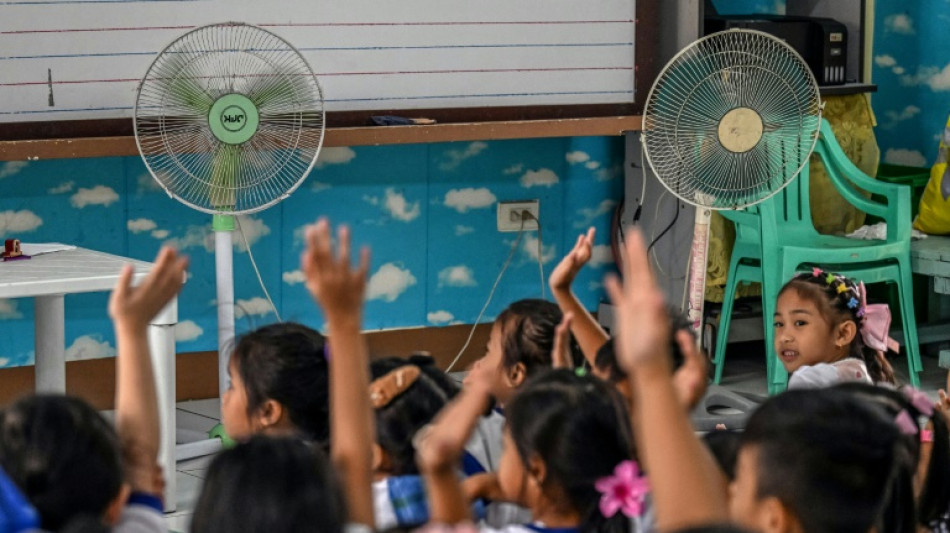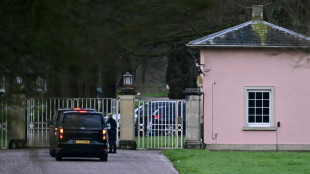
-
 Benfica investigate video of fans' monkey gestures
Benfica investigate video of fans' monkey gestures
-
French minister pledges tight security at rally for killed activist

-
 Guardiola 'couldn't care less' about Arsenal stumble in title race
Guardiola 'couldn't care less' about Arsenal stumble in title race
-
UK police search property as royals reel from Andrew's arrest

-
 Germany's Merz to visit China next week
Germany's Merz to visit China next week
-
Kompany says Mourinho made 'huge mistake' in Vinicius racism row

-
 X appeals EU's 120-mn-euro fine over digital content violations
X appeals EU's 120-mn-euro fine over digital content violations
-
Galthie recalls hulking locks Flament, Meafou for Italy

-
 Turkey, Saudi sign major solar power deal
Turkey, Saudi sign major solar power deal
-
US Olympic freeskier Hess embraces 'loser' tag after Trump blast

-
 European stocks rebound, oil prices ease after US-Iran volatility
European stocks rebound, oil prices ease after US-Iran volatility
-
'Alpha male' AI world shuts out women: computing prof Hall

-
 New Zealand freestyle skier Ives in hard Olympic crash
New Zealand freestyle skier Ives in hard Olympic crash
-
New Zealand must adapt quickly to Sri Lanka wickets: Chapman

-
 Thai activist's jail term for royal insult extended to 30 years
Thai activist's jail term for royal insult extended to 30 years
-
Families of Duterte's drug war victims eye Hague hearing with hope

-
 India chases 'DeepSeek moment' with homegrown AI
India chases 'DeepSeek moment' with homegrown AI
-
UN touts panel for 'human control' of AI at global summit

-
 Ukraine Paralympics team to boycott Opening Ceremony over Russian flag decision: statement
Ukraine Paralympics team to boycott Opening Ceremony over Russian flag decision: statement
-
UK monarchy reels from Andrew's stunning arrest

-
 Somaliland, where Muslims love Israel
Somaliland, where Muslims love Israel
-
Florida airport to be renamed after US President Donald Trump

-
 Fans flock to Japan zoo to see viral baby monkey Punch
Fans flock to Japan zoo to see viral baby monkey Punch
-
Stocks mixed, oil rises after Trump Iran threat

-
 Outspoken Laos lawmaker's election exit sparks rare dissent
Outspoken Laos lawmaker's election exit sparks rare dissent
-
Kim Jong Un vows to boost living standards as he opens rare congress

-
 Shepherd hat-trick to Samra ton: Five top T20 World Cup performances so far
Shepherd hat-trick to Samra ton: Five top T20 World Cup performances so far
-
Zimbabwe surprise as T20 World Cup Super Eights begin without Australia

-
 Victorious Takaichi promises 'strong and prosperous' Japan
Victorious Takaichi promises 'strong and prosperous' Japan
-
Ex-South Korea leader apologises for martial law crisis

-
 Ex-S. Korea leader apologises for martial law crisis
Ex-S. Korea leader apologises for martial law crisis
-
Messi kicks off MLS season in key World Cup year

-
 Teen burnout to Olympic gold: Alysa Liu 'looking to inspire others'
Teen burnout to Olympic gold: Alysa Liu 'looking to inspire others'
-
Cunningham stars as NBA-leading Pistons ease past Knicks

-
 Andre Gomes joins MLS side Columbus Crew
Andre Gomes joins MLS side Columbus Crew
-
Scottish inconsistency 'bugs everyone' says former international Beattie

-
 England turn to Pollock for Six Nations boost against Ireland
England turn to Pollock for Six Nations boost against Ireland
-
Arsenal aim to banish title jitters in Spurs showdown

-
 Scrutiny on Flick rises as Barca seek recovery
Scrutiny on Flick rises as Barca seek recovery
-
Leipzig host red-hot Dortmund with Champions League hopes slipping away

-
 Nvidia nears deal for scaled-down investment in OpenAI: report
Nvidia nears deal for scaled-down investment in OpenAI: report
-
Japan inflation eases in welcome news for PM Takaichi

-
 McIlroy shares Riviera clubhouse lead as Rai charges, Scheffler fades
McIlroy shares Riviera clubhouse lead as Rai charges, Scheffler fades
-
Philippines' Duterte earned global infamy, praise at home

-
 Stocks drop, oil rises after Trump Iran threat
Stocks drop, oil rises after Trump Iran threat
-
As European heads roll from Epstein links, US fallout muted

-
 Families of Duterte's drug war victims eye Hague hearing hopefully
Families of Duterte's drug war victims eye Hague hearing hopefully
-
Russian decision is a betrayal: Ukrainian Paralympics chief

-
 Venezuela parliament unanimously approves amnesty law
Venezuela parliament unanimously approves amnesty law
-
Martinez missing as Inter limp to Lecce after Bodo/Glimt humbling


Early holiday, more fans: Philippines schools adapt to climate change
Kindergarten teacher Lolita Akim fires up five standing fans with three more at the ready as she fights to hold the attention of her pint-sized pupils in Manila's soaring heat.
Last year, heatwaves forced millions of children in the Philippines out of school. It was the first time that soaring temperatures had caused widespread class suspensions, prompting a series of changes.
This school year started two months earlier than usual, so the term ends before peak heat in May. Classes have been rearranged to keep children out of the midday heat, and schools are equipped with fans and water stations.
The moves are examples of how countries are adapting to the higher temperatures caused by climate change, often with limited resources.
As a teacher, Akim is on the frontlines of the battle to keep her young charges safe and engaged.
"In this weather, they get drenched in sweat; they become uneasy and stand up often. Getting them to pay attention is more difficult," she said of the five-year-olds in her care at the Senator Benigno S. Aquino Elementary School.
Some six million students lost up to two weeks' worth of classroom learning last year as temperatures hit a record 38.8 degrees Celsius (101.4 degrees Fahrenheit), according to the education department.
Schools reported cases of heat exhaustion, nose bleeds and hospitalisations as students struggled through lessons in classrooms without air conditioning.
Scientists say that extreme heat is a clear marker of climate change, caused largely by burning fossil fuels like coal, oil and gas.
Last year's heat was further exacerbated by the seasonal El Nino phenomenon.
But even this year, nearly half Manila's schools were forced to close for two days in March when the heat index -- a measure of temperature and humidity -- hit "danger" levels.
"We've been reporting (the heat index) since 2011, but it's only been recently that it's become exceptionally warm," national weather service specialist Wilmer Agustin told AFP, attributing it to "El Nino and climate change".
This year, conditions in most of the country will range between "extreme caution" and "danger" on the government's heat alert system, he said, "especially in April and May".
On Friday, scores of schools in Manila were shuttered as temperatures were expected to hit 34C, while the national weather service said the heat index for at least five provinces would hit the danger level.
- 'Significant' impact -
During last year's closures, alternative learning helped make up some of the gap.
But "the overall impact on students' education was significant", said Jocelyn Andaya, assistant education secretary for operations.
So this year, a series of measures have been instated to avoid further learning loss.
Classroom sessions have been shortened to four hours a day -- avoiding the searing midday sun -- and water stations were installed in each classroom as well as at least two oscillating wall fans.
Some newer schools have heat-reflective roofs, and bigger ones now employ nurses.
Just three percent of students affected by last year's heatwaves were able to access online classes, so this year printed material was prepared for students if they must stay home.
Even so, Benigno Aquino school principal Noel Gelua cautioned that "there is no real alternative to face-to-face learning."
But there are limits to what can be done, given the education department has a budget of just 10 billion pesos ($174 million) for climate adaptation, infrastructure and disaster readiness.
The Philippines also has a perennial classroom shortage, with 18,000 more needed in the capital alone.
Manila's public schools do two shifts per day, with about 50 students in each 63 square-metre (678 square-foot) room, exacerbating the heat problem.
Fifth-grader Ella Azumi Araza, 11, can only attend four days a week due to the shortage.
On Fridays, she studies in her family's nine-square-metre cinderblock home on a bed she shares with her younger brother, who suffers from epilepsy.
Three electric fans are always on in the windowless, single-room structure.
As hot as it is at home, her mother Cindella Manabat still frets about conditions at school, saying that she comes home coughing.
"I make her carry a jug of water to prevent dehydration," she said.
- 'Difficult to teach' -
Across the street from Benigno Aquino, eighth-graders at President Corazon C. Aquino High School aimed tiny, rechargeable fans at their bodies while taking an algebra quiz.
Two of the four ceiling fans in the room had given out and the remaining two were clearly not enough for the 40 students.
"It is very difficult to teach in the heat," their teacher Rizzadel Manzano said.
"Motivating them is really a challenge."
A school uniform requirement was ditched earlier this year, and students now wear sweatpants and T-shirts donated by the city, principal Reynora Laurenciano told AFP.
Both schools are located in a densely populated slum area called Baseco, where conditions at home can be even more dire, she added.
"If you ask them, they consider (school) a safer place," Laurenciano said.
Ch.Havering--AMWN

